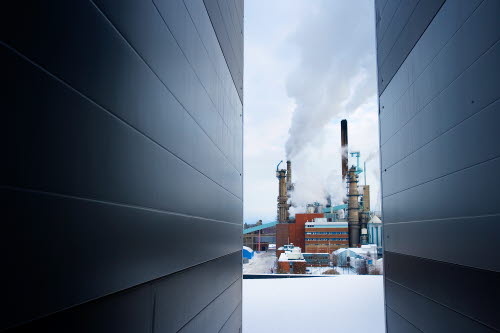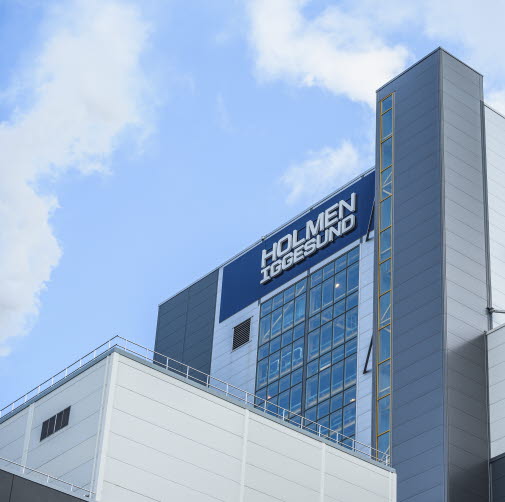Product certificates
Certificates for composting
A certified product can be composted in an industrial composting facility in accordance with the European standard EN 13432.
The mill at Iggesund in Sweden has a tradition dating back to 1685. It is one of the most advanced, fully integrated pulp and paperboard mills in the world.
Making the best paperboard in the world is simple. It takes water, carbon dioxide and sunlight to grow a tree from a seedling. Then it takes sustainable forest management that can deliver first-class timber. It also takes a pulp mill and a paperboard mill, and finally, distribution channels to get the paperboard to anyone who wants to use it. However, most important to the production of Invercote are the skilled professionals who do their best – people who take pride in what they achieve and never compromise on their work quality. Iggesund mill's traditions date back to 1685. All through this time, dedicated people have done their best to use the renewable forest for the benefit of others.
The Iggesund mill (including the Strömsbruk mill) in Sweden is one of the most advanced, fully integrated pulp and paperboard mills in the world. An integrated sawmill offers many advantages: We manage the raw materials together and use all waste from production to create pulp and energy. In return, we supply the mill with steam, which is used to dry the timber. At the Iggesund mill, 100% of the pulp used in the production of Invercote is produced on location and pumped wet to the board machine. This means that we do not use market pulp. The fact that the pulp is not dried means that some of the mechanical properties of the fibres are retained.
This advanced technology - hundreds of metres of paperboard machines - is controlled by employees with various special skills. The machines work around the clock, all year round, to produce tonne after tonne of bright white premium paperboard. Technical perfection and numerical control processes are good, but excellent results also require team spirit and a good working atmosphere. The unique characteristics of Invercote are the result of the interplay of know-how, a positive spirit and cutting-edge technology.
In 2012, the new recovery boiler was inaugurated at the Iggesund mill, an investment made possible by the long-term perspective of our majority owner. With the new boiler, the mill generates all the heat it needs and even supplies district heating to the nearby community. The boiler also generates almost all the electricity the mill needs and is connected to the power grid so that it can provide surplus electricity when needed. When the new boiler was trimmed into operation, it dramatically reduced a lot of emissions between 2013 and 2014: fossil CO2 by > 85%, particles by ~45%, and sulphur by ~35%.
With the installation and trimming of the new recovery boiler, emissions to air have dropped drastically from an already low level. Measurements have shown that only 1% of the particles in the air of Iggesund village come from the mill. Most of the particles come from household fireplaces and cars.
The paperboard must be there when the customer needs it. All the quality features in the world are only meaningful if deliveries arrive on time. Delivery precision is a high priority. A maritime transport system guarantees overseas customers receive shipments with the lowest possible environmental impact. The service continues beyond there. With every tonne of Invercote, you can access documentation and knowledge on how to use the paperboard best. Holmen Board and paper'a knowledge and market-oriented technical support help customers achieve brilliant end results and optimal production economics.

We operate according to globally recognised standards for forest stewardship and management of environmental, energy and quality aspects. All standards are integrated into business procedures and reviewed annually by internal and external specialists. There are certificates related to our operations as well as to our products. All of which can be downloaded further below. The certificates for the Iggesund Mill are also valid our conversion plant in Strömsbruk.
FSC®
FSC® (FSC-C110018) stands for Forest Stewardship Council® and is an international system for certification of forestry that has the support of many environmental organisations. Read more at ic.fsc.org.
PEFC
PEFC (PEFC/05-33-105) is short for Programme for the Endorsement of Forest Certification schemes. It was originally a European system for certification of forestry, but has gained global recognition. Read more at www.pefc.org.
ISO certificates
ISO 9001, ISO 14001 and ISO 50001 are international standards for quality management, environmental management and energy management. Read more at www.iso.org.
ISO 45001
This is an international standard for management of occupational health and safety. Read more at www.bsigroup.com.
EcoVadis
Holmen Iggesund's mills in Workington and Iggesund have been assessed separately and have both been awarded Platinum medal. The Platinum level means that your business is among the top 1 percent of all assessed companies. Read more at www.ecovadis.com.
Certificates for composting
A certified product can be composted in an industrial composting facility in accordance with the European standard EN 13432.
Adherence to additional standards related to for example food contact, toy safety and archiving are detailed in our product specifications for each product. For questions or requests for other certifications, please contact your local Iggesund representative.
Awards and recognitions
We are proud to have been awarded and included in various business indices for our approach to sustainability, including the UN Global Compact 100 and the Carbon Disclosure Project (CDP) A-list. You can read more about these indices in the section about Holmen and sustainability.
ISO 50001
ISO 14001
ISO 9001
ISO 45001
ECOVADIS SCORECARD
ECOVADIS rating certificate
FSSC 22000 Iggesund Mill and Strömsbruk Mill
FSC®
PEFC
Composting Invercote G
Composting Invercote GP + Bio E
Invercote - Environmental and Carbon Footprint Declaration
The paperboard made at Iggesund is made solely from chemically produced cellulose fibres. They are freed by cooking the timber in lye until it is dissolved. Wood comprises 50 per cent cellulose fibres, with the other 50 per cent being a binding agent, whose most significant component is a substance called lignin.
The carefully freed fibres are rinsed and bleached before they are ready to make the paperboard. The lignin that remains in the cooking water is burned to produce both thermal and electric bioenergy, which can supply the entire mill’s energy needs.
Today the mill has only a minimal impact on the local environment. For example, thanks to the purification system in place to take care of air- and water-borne emissions, it is impossible to differentiate by chemical analysis between fish caught immediately outside the mill site from fish caught in reference areas unaffected by the mill.

Please accept Marketing, Preferences and Statistics cookies to view this content.

